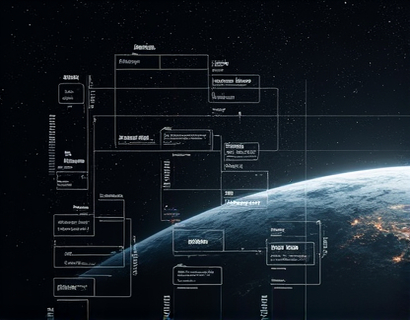Economic Navigators: Mastering Market Success in Modern Ecosystems
The landscape of modern economics has evolved significantly, transforming traditional markets into complex ecosystems where various stakeholders interact in intricate ways. This shift demands a new set of skills and strategies for professionals aiming to thrive in such dynamic environments. This guide delves into the economic dynamics of these modern ecosystems, providing strategic insights and detailed analysis to help economists, business leaders, investors, and industry experts stay competitive and informed.
Understanding the concept of an ecosystem in an economic context involves recognizing it as a network of interconnected entities, including businesses, consumers, suppliers, and regulators. Each component plays a crucial role, and the interactions between them create a self-regulating system that can adapt to changes and challenges. This interconnectedness presents both opportunities and challenges, necessitating a nuanced approach to market analysis and strategy formulation.
Key Characteristics of Modern Economic Ecosystems
Modern economic ecosystems exhibit several distinct characteristics that set them apart from traditional markets. One of the primary features is the high degree of interdependence among participants. In these ecosystems, the success of one entity often hinges on the performance of others, creating a web of dependencies that require careful management and strategic alignment.
Another key characteristic is the rapid pace of change. Technological advancements, shifts in consumer behavior, and global economic trends can alter the landscape almost overnight. This volatility demands that stakeholders be agile and responsive, continuously adapting their strategies to maintain a competitive edge.
Furthermore, modern ecosystems are marked by a high level of innovation. New business models, products, and services emerge frequently, driven by technological breakthroughs and changing consumer demands. This environment of constant innovation requires organizations to foster a culture of creativity and experimentation to stay relevant.
Strategic Insights for Navigating Economic Ecosystems
To succeed in modern economic ecosystems, professionals must develop a deep understanding of the underlying dynamics and adopt strategic approaches that leverage the unique opportunities these environments offer. Here are some key insights and strategies:
First, building strong network relationships is crucial. In an ecosystem, no entity operates in isolation. Establishing and maintaining robust connections with partners, suppliers, and customers can provide valuable insights, resources, and support. These relationships can also open doors to new markets and opportunities that might not be accessible otherwise.
Second, embracing digital transformation is essential. Technology plays a pivotal role in shaping modern ecosystems, from enhancing operational efficiency to creating new revenue streams. Investing in digital tools and platforms can help organizations streamline processes, gather data, and gain actionable insights that inform strategic decisions.
Third, fostering a culture of innovation is vital. Encouraging experimentation and risk-taking within the organization can lead to breakthroughs that drive growth and sustainability. This involves creating an environment where employees feel empowered to propose new ideas and where failure is seen as a learning opportunity rather than a setback.
Fourth, adopting a customer-centric approach is paramount. Understanding and anticipating customer needs and preferences is critical in a rapidly changing market. This requires not only collecting and analyzing data but also interpreting it to make informed decisions that enhance customer experiences and loyalty.
Identifying Emerging Market Opportunities
One of the most significant challenges in modern economic ecosystems is identifying emerging market opportunities. These opportunities often arise from disruptions caused by technological advancements, shifts in consumer behavior, or regulatory changes. To capitalize on these opportunities, professionals must develop a proactive and forward-looking mindset.
Market research and trend analysis are fundamental tools in this process. By staying abreast of industry trends and emerging technologies, professionals can spot early signs of change and position their organizations to benefit from new developments. This involves not only monitoring external factors but also conducting internal assessments to identify areas where the organization can innovate and differentiate itself.
Network analysis can also play a crucial role in identifying opportunities. By mapping the relationships and interactions within the ecosystem, professionals can uncover potential partnerships, synergies, and gaps in the market. This strategic approach can help organizations form alliances that enhance their competitive position and open up new revenue streams.
Strategies for Capitalizing on Market Opportunities
Once emerging opportunities are identified, the next step is to develop and implement strategies that capitalize on them effectively. Here are some strategies that can help professionals navigate and succeed in modern economic ecosystems:
First, agility and flexibility are key. In a dynamic environment, the ability to pivot quickly in response to new information or changing conditions can be a significant advantage. This requires building organizational structures and processes that support rapid decision-making and execution.
Second, leveraging data and analytics is essential. Data-driven decision-making allows organizations to make informed choices based on real-time insights. Investing in advanced analytics tools and fostering a data-centric culture can provide a competitive edge by enabling more accurate forecasting, risk assessment, and performance monitoring.
Third, focusing on sustainability and social responsibility can enhance long-term success. Consumers and stakeholders increasingly prioritize companies that demonstrate a commitment to environmental and social causes. By integrating sustainability into their core strategies, organizations can build trust, attract talent, and differentiate themselves in the market.
Fourth, fostering a collaborative mindset is crucial. In an ecosystem, collaboration can lead to collective success. Encouraging cross-functional teams and partnerships can drive innovation and efficiency, allowing organizations to tackle complex challenges more effectively.
Case Studies: Successful Navigation of Economic Ecosystems
To illustrate the application of these strategies, let's examine a few case studies of organizations that have successfully navigated modern economic ecosystems:
One notable example is a technology firm that recognized the growing demand for cloud computing services. By investing in cloud infrastructure and forming strategic partnerships with key players in the industry, the company was able to offer comprehensive solutions that met the evolving needs of its customers. This proactive approach not only helped the company capture a significant market share but also positioned it as a leader in the cloud computing space.
Another example is a retail brand that shifted its focus to e-commerce in response to the pandemic-induced shift in consumer behavior. By rapidly developing a robust online platform and enhancing the digital customer experience, the brand was able to maintain sales and even grow its customer base during a period when many traditional retailers struggled.
These case studies highlight the importance of staying attuned to market trends, being willing to innovate, and forming strategic alliances to capitalize on emerging opportunities.
Conclusion
Mastering the economic dynamics of modern ecosystems requires a combination of strategic foresight, agility, and a deep understanding of the interconnected nature of these environments. By building strong network relationships, embracing digital transformation, fostering innovation, and adopting a customer-centric approach, professionals can identify and capitalize on emerging market opportunities. Case studies demonstrate that organizations that proactively navigate these ecosystems are better positioned to achieve long-term success and sustainability.
For economists, business leaders, investors, and industry experts, staying informed and adaptable is not just an advantage—it's a necessity in today's fast-paced economic landscape. By equipping themselves with the knowledge and strategies outlined in this guide, they can navigate the complexities of modern economic ecosystems with confidence and drive meaningful value for their organizations.










































